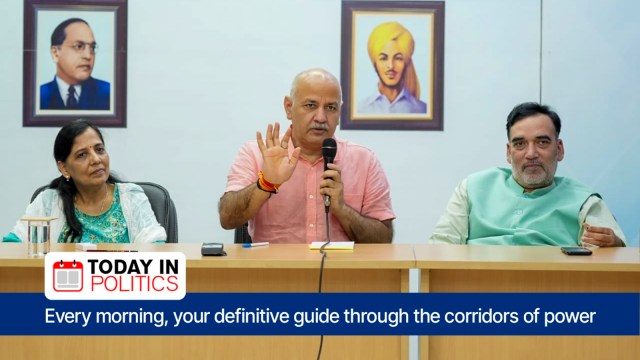© The Indian Express Pvt Ltd
Latest Comment
Post Comment
Read Comments
 Senior AAP leader Manish Sisodia with party leader Gopal Rai and Sunita Kejriwal, wife of Delhi Chief Minister Arvind Kejriwal, convenes a meeting with all AAP MLAs to formulate a political strategy ahead of the Delhi Assembly elections, in New Delhi. (PTI Photo)
Senior AAP leader Manish Sisodia with party leader Gopal Rai and Sunita Kejriwal, wife of Delhi Chief Minister Arvind Kejriwal, convenes a meeting with all AAP MLAs to formulate a political strategy ahead of the Delhi Assembly elections, in New Delhi. (PTI Photo) It’s back to the wall in Delhi, the Aam Aadmi Party (AAP) will attempt to begin making a turnaround on Wednesday with Manish Sisodia leading the way.
Always viewed as an organisation and policy man and never the one to lead the party out on the streets, the former Delhi Deputy Chief Minister — now the AAP’s most recognisable face in the absence of his boss and Delhi CM Arvind Kejriwal — will kickstart the party’s Assembly election campaign on Wednesday with a padayatra. The AAP will also release details on how it will carry forward the city-wide padayatra in the run-up to the election. The party also plans to hold “Vikas Sabhas” across all 70 Assembly constituencies in the city to reach out to people about the development work that the AAP government has done in the last 10 years.
In context: Getting the message across to voters, at a time when Delhi has been in the news for its civic infrastructure coming under strain during the Monsoon, will be the most important challenge for Sisodia and the AAP. In an interview with Jatin Anand, published on Tuesday, Sisodia blamed Lieutenant-Governor V K Saxena’s “dictatorship” for Delhi’s infrastructure problems.
But can the AAP beat anti-incumbency by pinning all the blame on the L-G and the tough hand that it has been dealt? Though the L-G has sweeping powers under the Government of National Capital Territory of Delhi (Amendment) Act, 2023, for the ruling party to communicate to voters that its hands are tied will be the key if it has to return to power for the third straight term.
Recommended readings:
Reason for Delhi’s infrastructure problems is L-G’s dictatorship’: Manish Sisodia
Delhi coaching centre tragedy: In AAP-BJP fight, people are neglected
A week after visiting Jammu and Kashmir, the Election Commission (EC) on Tuesday will meet Union Home Secretary Ajay Bhalla to discuss the security preparations in the Union Territory where elections have to be held by the end of September, as per the Supreme Court’s orders.
Chief Election Commissioner (CEC) Rajiv Kumar and Election Commissioners Gyanesh Kumar and Sukhbir Singh Sandhu visited the Union Territory last week to review the poll preparation. At a press conference in Jammu on August 9, Rajiv Kumar said the time had come for J&K to have its elected government. The CEC said the availability of forces and the security situation would be assessed before the announcement of the election schedule. A big challenge in terms of security is the recent spurt in terror attacks in Jammu.
What the numbers say: According to the Lok Sabha election results, the National Conference (NC) is the single-largest party in the 90-member Assembly, according to an analysis by Anjishnu Das.
The party led in 34 Assembly segments in the parliamentary polls, followed by the BJP in 29 Assembly segments, the Congress in seven, the Peoples Democratic Party (PDP) in five, and the Sajjad Lone-led People’s Conference in one segment. Independent MP Engineer Rashid who won from Baramulla led in all 14 Assembly segments of the constituency.
As things stand, the INDIA alliance combined — NC, PDP, and Congress — crossed the halfway mark of 45. But these parties failed to arrive at an agreement for the parliamentary polls — the PDP contested on its own after the NC refused to give way in Kashmir — and whether they can do so for the Assembly elections is the big question.
The Supreme Court is scheduled to rule on whether its July 25 verdict upholding the power of states to levy tax on mineral rights and mineral-bearing land will have a retrospective or prospective effect.
In an 8:1 majority ruling on July 25, a nine-judge Constitution Bench held that legislative power to tax mineral rights lay with states. The court overruled the decision of a seven-judge Bench in India Cement Ltd vs State of Tamil Nadu that said royalty was tax and state legislatures lacked the competence to levy taxes on mineral rights because the subject matter is covered by the Minerals and Mines and Minerals (Development and Regulation) Act, 1957, enacted by Parliament in the exercise of powers under the Union List of the Constitution.
With some Opposition-ruled, mineral-rich states seeking the refund of royalty levied on mines and minerals since the 1989 verdict, the Centre told the court that it would affect PSUs. The Union government told the court that the effect of its verdict “is substantial and far-reaching” and urged it to declare that the verdict shall apply only prospectively.
Recommended reading: ‘Royalty is not a tax’: How Supreme Court recognised states’ powers to tax mining activities
Also happening:
Following the Calcutta High Court’s directive, the CBI has taken over the investigation into the alleged rape and murder of a doctor at Kolkata’s RG Kar Medical College. CBI investigators and forensic and medical experts will visit Kolkata on Wednesday. The Mamata Banerjee government is facing a lot of heat from the Opposition and civil society over the case. How this unfolds politically for the Trinamool Congress (TMC) and its chief is one of the big questions.






